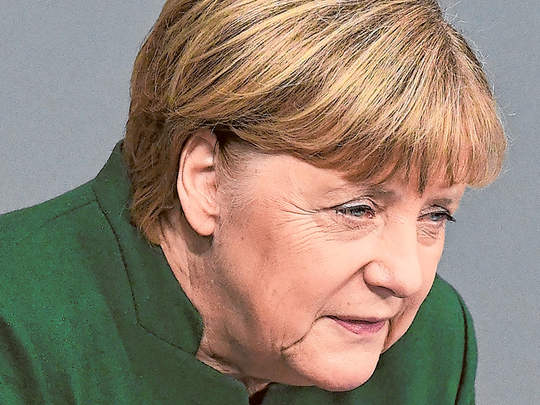
Berlin: Angela Merkel positioned herself as a force for stability in what she called “exceptionally difficult” and uncertain times after she ended months of speculation and announced that she will run for a fourth term as German chancellor.
Saying that she had weighed her decision “endlessly,” Merkel said that she will seek re-election as chairwoman of her party and will then contest next year’s federal election. She intends to serve a full, four-year term, “as long as my health allows it.”
“This election will be difficult like no other before it,” Merkel said. “We will be grappling with challenges from all sides, from the right as never before and from a strong polarisation of our society.”
With US President-elect Donald Trump assuming office in January and the UK preparing to leave the European Union, Merkel is defending her position as Europe’s pre-eminent leader amid unprecedented political uncertainty. A referendum in Italy and an Austrian presidential ballot in two weeks, followed by elections in the Netherlands, France and then Germany will all test voter appetite for populist candidates who promise to upset the established order.
Citing the refugee crisis, the conflict in Syria and Brexit, Merkel said that the EU faces “great tensions.”
The impact of the US election and questions over western ties with Russia add to “a global situation that, to put it lightly, has to re-orient itself.” The result is she’ll be running in what are “exceptionally difficult and, one can also say, uncertain times.”
“This removes any last bit of uncertainty,” Carsten Nickel, an analyst for Teneo Intelligence, said. “For the markets, it’s positive” and it’s reassuring for wider Europe, he said. “Even if they don’t agree on everything, people know her, they know what to expect from her.”
Teneo put the chance of a fourth Merkel term at 80 per cent.
All the same, the chancellor said that it is “grotesque and absurd” to expect that any one person, “even with the greatest experience, can fix the situation for better or worse in Germany, Europe and the world — and certainly not a German chancellor”.
Her goal instead will be to work toward mending divisions in Germany. “Right now, I feel well prepared and have ideas,” she said.
Merkel’s bid to retain the party leadership she has held since 2000 will now go to a vote at the CDU’s annual convention in the western city of Essen in early December. Assuming she is re-elected chairwoman, she will then contest federal elections in the fall of next year as her party’s candidate for chancellor.
Germany’s first female chancellor and its first from the formerly communist East has been weakened by a populist backlash against her policy of allowing almost 1 million refugees to enter Germany last year, a decision that fuelled backing for the anti-immigration Alternative for Germany. While the opprobrium heaped on her contributed to Merkel’s hesitancy over trying to extend her tenure as chancellor, she said the refugee crisis was not the sole reason for her deliberations.
A two-day visit by President Barack Obama on his farewell overseas trip underscored what’s at stake for Europe faced with uncertainty over the incoming Trump administration’s policy in areas such as free trade, Nato and Russia. Calling her “outstanding” and his closest international partner, Obama all but endorsed her to run again while saying that any weakening of the trans-Atlantic alliance would lead to a “meaner, harsher and tougher world.”
Polls suggest support for her bloc has stabilised as measures to curtail the influx of refugees and ease the return of those whose applications for asylum are rejected take effect. The approval ratings for her CDU/CSU bloc were at 33 per cent in an Emnid poll for the Bild am Sonntag newspaper. That compared with 24 per cent for the SPD, 12 per cent for the opposition Greens, 9 per cent for the anti-capitalist Left Party and 5 per cent for the Free Democrats, her second-term coalition partner. The AfD had 13 per cent.
The same poll showed 55 per cent of voters favoured another term for Merkel, up from 42 per cent in August. Among her own party’s supporters, 92 per cent back her for a fourth term, while among women the figure was 66 per cent. Even among SPD voters, 54 per cent said they wanted Merkel to stand again.
Hurdles to her re-election remain. Any further terrorist attack in Germany linked to radicalised immigrants or the collapse of a controversial refugee deal with Turkey could upend her bid for the chancellery.












